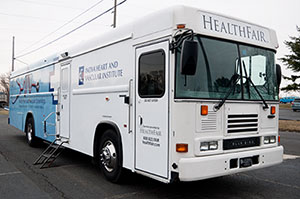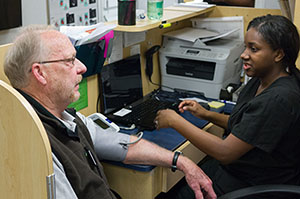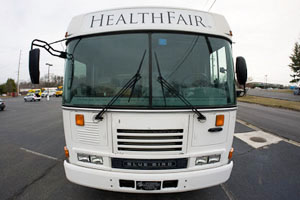Hospitals hoping to attract patients and build their brands are teaming up with medical-screening companies to promote tests aimed at consumers worried about potentially deadly heart disease or strokes.
What their promotions don’t say is that an influential government panel recommends against using many of the tests on people without symptoms or risk factors. The panel says such screenings find too few problems to outweigh their drawbacks, which include false positive results, follow-up procedures and potentially unnecessary surgery. Other medical experts warn that the tests could needlessly raise health-care spending.
Inova Health System, one of the Washington, D.C., region’s largest hospital networks, is partnering with a screening company called HealthFair to blanket the region with direct mail and advertisements promoting a $139 package of what it describes as “five life-saving tests for heart disease and stroke.” The tests, which usually are not covered by insurance, are performed in specially equipped buses, operated by HealthFair, that carry the Inova logo and travel to different locations.
Similar programs by other hospitals are taking place in dozens of cities across the country, including Richmond, Va., Tyler, Texas, Marin, Calif. and the suburbs of Chicago.
“A lot that ends up being found is clinically of no importance at all,” said Steven Weinberger, executive vice president and chief executive of the American College of Physicians.
Such screenings “not only can raise [health care] costs, but also can lead to additional testing that is harmful,” Weinberger and two co-authors wrote in the Annals of Internal Medicine journal in August, calling hospital involvement without disclosing potential downsides “unethical.”
But Inova and other hospitals say the screenings help raise awareness of heart disease and stroke and spur important discussions between patients and their doctors. Consultants say they are also a way to create community good will and draw new patients and revenue.
“We know the incidence of finding a disease where the patient has to do something about it today, or tomorrow, or next week, is very low, but that’s not why we engaged in the screening,” said David Spinosa, an interventional radiologist and medical director of the Inova Heart and Vascular Institute. “If people learn they have early signs of a disease — if their physicians know that — then they have an opportunity to aggressively modify their risk factors.”
Spinosa said that about 45 percent of the 8,000 people screened since the program’s inception had some abnormal finding, mostly on the mild side; critical problems were uncovered in fewer than 1 percent of cases.
Inova doesn’t pocket anything from the testing; in fact, it pays HealthFair to put the Inova logo on the buses. But patients can sign a form allowing someone from the hospital group to contact them to discuss abnormal findings, and a list of Inova doctors is available on the buses.
“It’s a way to promote brand awareness and have someone sitting there who can say, ‘I have just the doctor for you,’ ” said Mitch Morris, of Deloitte, a consulting firm whose clients include hospitals. “If they hook someone up with a primary care physician, that sets up in many cases a lifetime of patronage to that health system.”
David Andrews, marketing and public relations manager at Inova Fairfax Hospital, declined to say how much the five-hospital chain pays HealthFair, or how many referrals it gets as a result of the testing.
“Hospitals want to do outreach. They feel they need to,” said Joelle Reizes, global communications director at Life Line Screening, an Ohio-based firm that partners with 180 hospitals to offer screenings. [But] there’s also a philosophical debate here: Do people have a right to know what’s going on inside their bodies and have screenings they feel are right for them?”
Why Some Tests Are Controversial
Hospitals have long done screenings, sending mammogram units to community events and sponsoring health fairs, where people can get their blood pressure tested. There is widespread agreement that some tests — such as those for high blood pressure and diabetes — are safe and effective and that they lead to better health outcomes.
But the five-test basic package advertised by HealthFair is much more elaborate. It includes ultrasound tests for blockages of the carotid artery and weak spots in the abdominal aorta; a resting electrocardiogram, or EKG; a test of elasticity of the arteries; and another for blockages in arteries serving the legs, a condition called peripheral arterial disease. Similar test packages are offered by Life Line Screening and its hospital partners.
The U.S. Preventive Services Task Force, an independent government panel charged with evaluating such care, recommends against routine use of four of the five tests in adults without symptoms or risk factors. The panel does support the ultrasound looking for abdominal aortic aneurysms — but only for men age 65 to 75 who have smoked.
Additionally, two of the tests — EKGs and ultrasounds for blocked carotid arteries — are among 130 procedures that a coalition of 19 physician organizations say are overused and should be questioned by both patients and their doctors.
False-positives, or results that erroneously indicate disease, are more likely when screening widely for a condition that affects only a small percentage of people – for instance, narrowing of the carotid artery, a risk factor for stroke estimated to affect about 1 percent of people over age 65.
Because the condition is so rare, the task force estimates that 4,348 people would need to be screened with both ultrasound and a follow-up magnetic resonance imaging test to prevent a single stroke.
The test “is potentially selling false reassurance to some people and at the same time, it’s really frightening others,” said Glen Stream, board chairman of the American Academy of Family Physicians, which lists the carotid test as an overused procedure. “Let’s say a patient is 65 years old and has a 60 percent block. It might have been 60 percent since that person was 40 and hasn’t changed.”
‘These Tests Don’t Do Harm’
HealthFair CEO Terry Diaz said in an e-mail that early detection of risk factors for heart disease and stroke saves lives, and HealthFair’s data “clearly indicate that a large percentage of the asymptomatic population do, in fact have unknown disease processes forming.”
Of 220,000 tests the company performed in a recent nine-month period, 11.6 percent showed mildly abnormal results and another 2.1 percent had results at least moderately abnormal, according to data provided by the firm.
Diaz’s statement notes that many of the country’s almost 50 million uninsured people cannot afford regular health care. “HealthFair was created to fill this gap” by offering relatively low-cost testing packages and then partnering with hospitals to contact those with abnormal results, it says.
Diaz said the company, based in Winter Park, Fla., follows the recommendations of the American College of Cardiology Foundation and the American Heart Association on which patients should get screening tests. He added that while further study is needed to “truly determine the effectiveness of those tests in determining cardiovascular risk, the ACCF/AHA clearly supports the screenings that HealthFair performs.”
But the groups’ guidelines do not support routine screening of the general public with some of the tests HealthFair promotes.
Spokeswomen for the two groups confirmed that their guidelines recommend against the measure of arterial stiffness for adults without symptoms. The guidelines say the carotid artery test is reasonable only for those with some risk factors.
A check of the peripheral arteries could be appropriate if a patient has trouble walking or had non-healing wounds or leg pain when resting. A third test — the resting EKG — “may be considered” to assess cardiac risk in adults without symptoms, the guidelines say.
John Gordon Harold, president of the American College of Cardiology, said in an e-mail that the guidelines from his group and the heart association do not endorse HealthFair or any other screening company. “Neither organization recommends broad screening or specific drugs, devices or companies in those guidelines,” he said.
Screening proponents say the efforts are worthwhile despite the small number of serious problems found in part because they spur important discussions between patients and doctors.
“These tests don’t do harm. People are not exposed to radiation,” said Johnna S. Reed, vice president of business development at Bon Secours St. Francis’s Health System in Greenville, N.C., which began doing screening programs with Life Line Screening a year ago. “I want people to have this information.”
Worried Consumers Sign Up
Fear of stroke or heart attack is what draws many people to screening programs, including Thomas White, 29. The Chantilly, Va., resident recently paid $350 for a package that includes the five basic tests, along with several others checking for risk factors for heart disease.
“I’ve had several coworkers who have had heart problems,” said White, who had the tests at an Inova/HealthFair bus parked in a Walmart parking lot. “One of them died. I’m a family man, so I wanted to make sure I’m ok.”
White, who has no health insurance, said he would try to find a doctor to discuss the results. He admits that what he really needs to do is quit smoking.
Corrinne Naranjo, 66, of Centreville, said the tests were worth the time and money.
“How many people are walking around with diabetes and don’t know they have it? Or heart problems?” she asked.
All of the patients at the HealthFair bus the morning White and Naranjo were there said that direct mail or newspaper advertisements had prompted them to sign up for the tests. Some of the mailings included a cover letter that said “80 percent of strokes can be prevented” — a figure questioned by some experts, including HealthFair’s medical director.
“I’m not aware of any study that proves that number,” said Geoffrey Toonder, a retired cardiothoracic surgeon, whose signature appears on the mailing.
More Limited Screenings At Other Hospitals
Area hospitals that do not participate in the HealthFair promotion provide more limited screenings for heart disease and stroke risk, and in most cases the tests are free.
Suburban Hospital in Bethesda, Md., for example, offers free screenings for abnormal or diseased veins in the legs. After a quick visual exam, patients with potential problems might be referred for ultrasound tests, for which the patient would have to pay, said Andrew Schulick, a vascular surgeon. Suburban does not sponsor the screening packages offered by HealthFair or Life Line.
Schulick said that in his opinion screening the general population is not “achieving a whole lot in terms of improving community health, because you’re not going to find a lot of people” with problems. He said that anyone older than 60 with risk factors — such as hypertension, a history of smoking, diabetes, high cholesterol or a family history of heart disease or stroke – are “the folks who ought to get screened.”
Shady Grove Adventist and Washington Adventist sponsor some tests that the U.S. Preventive Services Task Force recommends against as a broad screening measure, including ultrasounds of the carotid arteries and checks for peripheral arterial disease.
The hospitals, part of Adventist HealthCare, say they offers the tests free at least twice a year and ask patients if they have any risk factors, including being older than 50, smoking and having diabetes, or high blood pressure or cholesterol, said Kathleen Coleman, the system’s Cardiac & Vascular Outreach Coordinator for Health & Wellness.
And a few hospitals are actually moving counter to the trend, deciding to scale back or end their heart risk and stroke screenings.
Thomas Jefferson University Hospital in Philadelphia, for example, is wrapping up a year-long screening effort with HealthFair this month, according to spokeswoman Lee-Ann Landis.
While the effort did promote brand recognition, it uncovered too few serious health problems and resulted in too few referrals of new patients to be continued, said Landis. About 20 patients of about 5,000 screened sought additional help through Jefferson, she said.
HCA Virginia Health System in Richmond plans to end its general community screening program through HealthFair, but it will offer the service to employers that request it, said spokesman Mark Foust.
“We want all of our public screenings to be completely appropriate,” he said.









